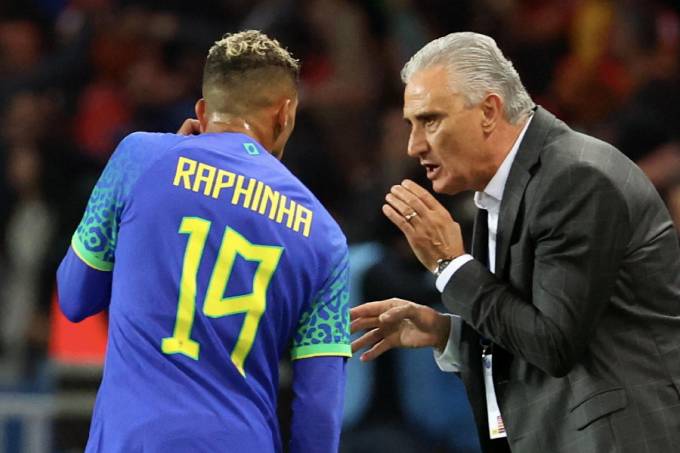Psychologist Tete’s lack of psychology
5 min read
It is very common in Brazil for the failure of an athlete or sports team to be attributed to emotional factors. We’ve already seen this debate play out several times at the Olympics and World Cups. In the Qatar World Cup It was no different. And many sports journalists questioned the psychological readiness of the team, noting this Tete He had refused to attend a psychologist, claiming that his team would do the work. But was the Rio Grande do Sul coach ready to play this role?
Before answering, it is necessary to point out that Tite’s attitude is the rule rather than the exception among Brazilian coaches. Among Serie A clubs, a minority have psychologists in their divisions. This is partly due to the arrogance of the coaches, who believe they understand psychology more than psychologists, and partly to ignorance, because they do not know the role of the psychologist on their team. Among the exceptions, there is only the current Brazilian champion Palmeiras who, coincidentally or not, has achieved important victories in recent years. But it’s worth noting that psychologist Giselle Silva existed long before Abel Ferreira, and wasn’t fired when the club did poorly. Similarly, the Medical Division and Athlete Performance Center have been under the direction of Dr. Gustavo Magliuca and Pedro Pontan since 2016.
Experience with successful clubs shows that mental health professionals are part of the athlete’s health team, which, unlike the coaching staff, should not measure the quality of their work in the number of titles. This is because the team psychiatrist has a basic moral obligation to look after an athlete’s mental health, in the same way that the medical team takes care of the physical health: no one would consider firing the team doctor, Dr. Rodrigo Lasmar, because Brazil went down. In the quarterfinals and not even because some of the athletes were injured. Unless there is insufficient physical preparation and rehabilitation, the medical team will continue with the new coaching staff. It has been this way for nearly 30 years at CBF, and it should be no different with the mental health team.
But this does not seem to be the understanding of the Brazilian Football Confederation or Tite. During the competition, the coach insisted that the players must be “mentally strong”. The phrase seems to have been repeated like an incantation by the players, and Neymar himself revealed in an open letter that he will “never forget this phrase”. Tite never made clear how he would achieve this goal. Apparently, he had just had self-help words etched into the walls of his CT scanner, showing a rather sketchy knowledge of an athlete’s emotional readiness, and making his reputation as a “snake charmer” resonate throughout the world of sports.
During the cup, Tite made sure to show his group’s unity and commitment to the players, including doing a pigeon dance in the match against Korea. In Brazil, this kind of collusion between leaders and followers is often overestimated, and having a “group in hand” is an end in itself. While group unity is important, it is not the key element in a short-term competition such as the Cup. Often, the individual confidence of a player, the result of good psychological work – as witnessed by the Argentine goalkeeper Emiliano Martinez – can be decisive for the success of the group as a whole.
Like other coaches, Tite seems to reduce psychology to an act of believing in victory, using the religious syncretism so typical of Brazilian culture. No wonder most coaches have some Saint or Saint as their greatest inspiration for victory. But this kind of belief, called magical thinking, so highly valued in a corporate environment, can be very harmful in a sports environment. They function as a childish idea: “If I believe in something so much, it will happen.” The problem is not preparing for hard times.
An obvious example of this is the penalty shootout: it is very common for a team to face a penalty shootout at least once during a cup, and it is essential to mentally prepare for that moment. But the impression left is that everything was improvised: no one seemed to have studied the way the Croatian goalkeeper falls, no one directed Alisson the way Croatian players usually hit, and no one even thought about the order of the batsmen. (such as previously discussed). It appears that the technical committee, which includes penalty specialists such as Taffarel, was not prepared to be “mentally strong” in the eventual penalty shootout. Here’s the magic trick: If I think I’m going to win the match in regular time, I don’t need to prepare for a penalty shootout.
And it was precisely at the end of the penalty shootout that Tite showed his lack of knowledge of psychology. When he left the field after the defeat on penalties, he rationally justified his position: “This is what I always do, even when I win.” At that moment Tite made it clear that he himself could benefit from professional help – and there is no irony here – as he did not seem to understand the emotional impact on the players at that moment, unlike Modric who surrendered like a father. His celebration parallels his son Rodrigo (for whom he was named).

It’s time to realize that the famous phrases and “dummies” that enchanted the world of sports six years ago were not able to hide what was already wide open at the 2014 World Cup, when the presence of an emergency psychologist was unable to avert the tragedy of 7 x 1: begins Emotional work now, even before choosing a new coach, and picking up the remaining pieces along the way as psychologist Titi fails.
* Gustavo Bonini Castellana is a Clinical and Forensic Psychiatrist, Master and Doctor of Science from FMUSP.

“Entrepreneur. Music enthusiast. Lifelong communicator. General coffee aficionado. Internet scholar.”

:strip_icc()/s04.video.glbimg.com/x720/11792055.jpg)

:strip_icc()/s03.video.glbimg.com/x720/11786998.jpg)



